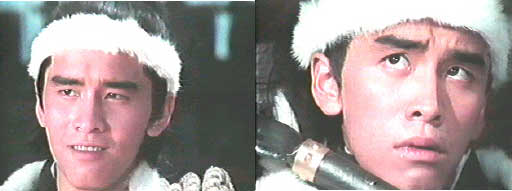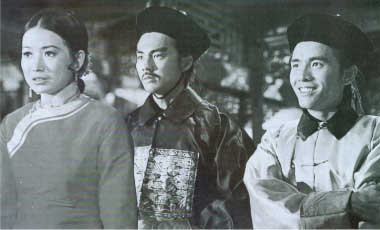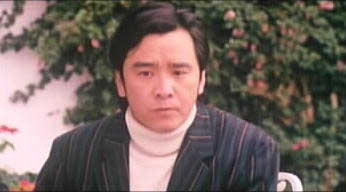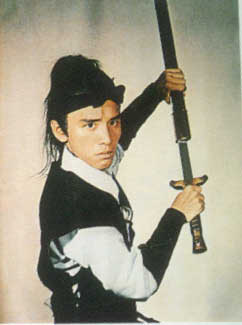David Chiang
By Yves Gendron
Most of today’s Hong Kong viewers would know
of David Chiang for having played Luke, the ill fated would be revolutionary
of ONCE UPON A TIME IN CHINA II starring Jet Li. Few would guess that twenty
years before OUATIC, it was Chiang who was one of the top martial stars
of his time, cutting down and fighting dozens of enemies at a time, jumping
about like a graceful gazelle, a dashing cool dude with a wily smile on
his face. Paired with the majestic Ti Lung they were the great "Deadly
Duo" of Hong Kong martial cinema, the stars of a dozen "Blood Brothers"
movies that were the most violent and intense martial potboilers of the
early seventies and they ruled the Hong Kong action movie screens. Yet
as the Blood Brothers period came to an end and time passed on, his partner
Ti Lung went on to have a successful movie career maintaining his flawless
reputation, but Chiang’s career began to decline and even worse he, along
with (Jimmy) Wang Yu, became one of the most under appreciated kung fu
performers of all. Later fans of the genre found his physical skills unsatisfactory,
complained about the tacky seventies fashions which he often wore and were
a bit annoyed by his screen persona. The fact remains though that Chiang
was not only a major player in his time but an able screen-action performer
as well as an award winning actor with an original screen persona who often
outshone Ti Lung. He was the real heart and centre of some of Chang's Blood
brothers movies.
 David Chiang was born Yim Wai in 1947, the second
son of two famed actors Yim Dut and Hong Wei. Later on his widowed mother
having remarried with a movie producer she gave birth to another son. All
three siblings were destined to a have a great movie career: the
first Paul Chun as a renown character actor and the youngest Derek Yee
as an actor/director. Young Wai received a college education in Hong Kong
but had already started appearing in movies as a child actor, most notably
THE CALLS OF THE NIGHTBIRDS, LITTLE ANGEL OF THE STREET and YOUNG VAGABOND
the two latter also featuring his elder brother Paul Chun (then known
asYim Cheong) and produced by his step-father. He also appears to have
received some Peking Opera training - not enough to make him a top performer
the likes of Jackie Chan or Sammo Hung but more than enough to gave him
an unusual agility and solid physical skills. Following graduation,
he started working as a stuntman in the movies.
David Chiang was born Yim Wai in 1947, the second
son of two famed actors Yim Dut and Hong Wei. Later on his widowed mother
having remarried with a movie producer she gave birth to another son. All
three siblings were destined to a have a great movie career: the
first Paul Chun as a renown character actor and the youngest Derek Yee
as an actor/director. Young Wai received a college education in Hong Kong
but had already started appearing in movies as a child actor, most notably
THE CALLS OF THE NIGHTBIRDS, LITTLE ANGEL OF THE STREET and YOUNG VAGABOND
the two latter also featuring his elder brother Paul Chun (then known
asYim Cheong) and produced by his step-father. He also appears to have
received some Peking Opera training - not enough to make him a top performer
the likes of Jackie Chan or Sammo Hung but more than enough to gave him
an unusual agility and solid physical skills. Following graduation,
he started working as a stuntman in the movies.
 Chiang had graduated to fight-instructor by the
time he was spotted by Shaw Brothers leading martial art director Chang
Cheh, who brought him into the studio in the winter of 1966 where he then
groomed him for a couple of years. By the time he emerge he was known as
David Chiang Dai-Wai,. The meaning of his stage name and it’s origin appear
to be rather obscure: Chiang he may have taken it for no other reason than
it was a very recognizable name (because of Taiwan president Chiang Kai
Shek) with a star quality feel to it. His original first name being Wai
, “Dai” was added to make it mean “True Greatness”, “Dai-wai” being also
the direct transliteration of the English name “David”, it may also have
been deemed a suitable stage-name for him because his small frame and scholarly
looks were evocative of the Biblical David of the David and Goliath famed.
Having an English name may also have served to give him a suitable urbane
and sophisticated air that played well with his deceptively scholarly,
effete look. Regardless Chiang Dai wei can be glimpsed in GOLDEN SWALLOW
(1968) as well as THE INVINCIBLE FIST (1969), but his first major role
was in the gangster flick DEAD END (1969). He graduated to full martial
star the following year with WANDERING SWORDSMAN and especially VENGEANCE,
the first of Chang Cheh’s "Blood Brothers" movies pairing the deadly duo
of Chiang and Ti Lung. It was also a watershed movie of Hong Kong martial
arts cinema that defined and cemented Chang Cheh’s cinematic approach for
years.
Chiang had graduated to fight-instructor by the
time he was spotted by Shaw Brothers leading martial art director Chang
Cheh, who brought him into the studio in the winter of 1966 where he then
groomed him for a couple of years. By the time he emerge he was known as
David Chiang Dai-Wai,. The meaning of his stage name and it’s origin appear
to be rather obscure: Chiang he may have taken it for no other reason than
it was a very recognizable name (because of Taiwan president Chiang Kai
Shek) with a star quality feel to it. His original first name being Wai
, “Dai” was added to make it mean “True Greatness”, “Dai-wai” being also
the direct transliteration of the English name “David”, it may also have
been deemed a suitable stage-name for him because his small frame and scholarly
looks were evocative of the Biblical David of the David and Goliath famed.
Having an English name may also have served to give him a suitable urbane
and sophisticated air that played well with his deceptively scholarly,
effete look. Regardless Chiang Dai wei can be glimpsed in GOLDEN SWALLOW
(1968) as well as THE INVINCIBLE FIST (1969), but his first major role
was in the gangster flick DEAD END (1969). He graduated to full martial
star the following year with WANDERING SWORDSMAN and especially VENGEANCE,
the first of Chang Cheh’s "Blood Brothers" movies pairing the deadly duo
of Chiang and Ti Lung. It was also a watershed movie of Hong Kong martial
arts cinema that defined and cemented Chang Cheh’s cinematic approach for
years.
For a couple of years the Blood Brothers movies
were all the rage, Hong Kong’s top ranking box office champions with such
films as HEROIC ONES, THE SINGING KILLER (both 1970), THE NEW ONE ARMED
SWORDSMAN, THE DUEL, DUEL OF IRON FIST, THE DEADLY DUO, THE ANONYMOUS HEROES
(all 1971) and THE ANGRY GUEST (1972). Ti Lung and Chiang were paired
splendidly together – a wonderful contrast to one another - Ti Lung big,
majestic, very masculine and impetuous; Chiang small, urbane, dashing,
wily yet secretive and introverted. Chiang had very much an effete, romantic
quality to him but instead of being ineffectual and passive as these types
of characters tended to be within the frame of Chinese literature, he could
go on a rampage or quietly undermine an opponent with his sneaky, mysterious
ways. This gave him an air of ambiguity, as nobody knew where he stood
for a while.
 With the sudden arrival of Bruce Lee in late 1971,
the Blood Brothers movies lost some of their steam - their formula began
looking tired and Chang Cheh appeared to be losing interest
Still, Chiang remained very active by performing in a handful of Chang
martial extravaganzas such as THE WATER MARGIN (aka: SEVEN BLOWS OF THE
DRAGONS), THE FOUR RIDERS, TRILOGY OF SWORDSMANSHIP (all 1972) and the
PIRATE (1973). He was continually paired with Ti Lung but the drama and
the chemistry between them wasn't quite the same as in the old Blood Brothers
movies. He also played a small but crucial role of a dashing, charismatic
young gang boss in BOXER FROM SHANTUNG (1972) which was the starring debut
of Chang Cheh’s latest discovery, kung fu star Chen Kwan Tai. He was also
the star of a couple of Chang’s contemporary dramas such as YOUNG PEOPLE
(1972), GENERATION GAP (1972) and FRIENDS (1973).
With the sudden arrival of Bruce Lee in late 1971,
the Blood Brothers movies lost some of their steam - their formula began
looking tired and Chang Cheh appeared to be losing interest
Still, Chiang remained very active by performing in a handful of Chang
martial extravaganzas such as THE WATER MARGIN (aka: SEVEN BLOWS OF THE
DRAGONS), THE FOUR RIDERS, TRILOGY OF SWORDSMANSHIP (all 1972) and the
PIRATE (1973). He was continually paired with Ti Lung but the drama and
the chemistry between them wasn't quite the same as in the old Blood Brothers
movies. He also played a small but crucial role of a dashing, charismatic
young gang boss in BOXER FROM SHANTUNG (1972) which was the starring debut
of Chang Cheh’s latest discovery, kung fu star Chen Kwan Tai. He was also
the star of a couple of Chang’s contemporary dramas such as YOUNG PEOPLE
(1972), GENERATION GAP (1972) and FRIENDS (1973).
 1973 also saw Chiang as part of the trio assembled
along with Ti Lung and Chen Kwan Tai in Chang Cheh’s most ambitious martial
movie drama to date: BLOOD BROTHERS aka: DYNASTY OF BLOOD. In 1974 he was
picked by Shaw Studios to play the Chinese lead in the Shaw Brother/ Hammer
hybrid horror/kung fu production LEGEND OF THE SEVEN GOLDEN VAMPIRES, which
was Chiang’s one shot at international stardom. It showed him in good fighting
form and speaking fluent if accented English, but unfortunately his role
was pretty much limited to being of the helpful and disposable amiable
ethnic man-servant variety.
1973 also saw Chiang as part of the trio assembled
along with Ti Lung and Chen Kwan Tai in Chang Cheh’s most ambitious martial
movie drama to date: BLOOD BROTHERS aka: DYNASTY OF BLOOD. In 1974 he was
picked by Shaw Studios to play the Chinese lead in the Shaw Brother/ Hammer
hybrid horror/kung fu production LEGEND OF THE SEVEN GOLDEN VAMPIRES, which
was Chiang’s one shot at international stardom. It showed him in good fighting
form and speaking fluent if accented English, but unfortunately his role
was pretty much limited to being of the helpful and disposable amiable
ethnic man-servant variety.
 That same year, a world-wide economic crisis struck
Hong Kong and that along with the disarray of the martial art’s genre following
Bruce Lee’s death, forced Shaw Brother to reduce their expenses which they
did by letting go of some of their major stars, including David Chiang
- although he would always remain closely associated with the studio on
a freelance basis. His first independent effort was trying his hand
at directing a social drama of all things - titled THE DRUG ADDICT, which
turned out to be a flop.
That same year, a world-wide economic crisis struck
Hong Kong and that along with the disarray of the martial art’s genre following
Bruce Lee’s death, forced Shaw Brother to reduce their expenses which they
did by letting go of some of their major stars, including David Chiang
- although he would always remain closely associated with the studio on
a freelance basis. His first independent effort was trying his hand
at directing a social drama of all things - titled THE DRUG ADDICT, which
turned out to be a flop.
 For the following decade Chiang would alternate
between movies for Chang Cheh/ Shaw Brothers, some freelance work and his
own productions. His Chang Cheh movies included SAVAGE FIVE (1974), FIVE
SHAOLIN MASTERS (aka FIVE MASTER OF DEATH), ALL MEN ARE BROTHERS (both
1975), SEVEN MEN ARMY, SHAOLIN TEMPLE (both 1976), NAVAL COMMANDOS and
MAGNIFICENT WANDERER (1977). Most of these films appear to have been routine
efforts from Chang when compared to his earlier works with Chiang, capitalizing
mostly on a stellar kung fu cast. In 1976, Chiang once again tried his
hand at directing with the CONDEMNED. Probably in the hope of revitalizing
his by now sagging career, Chiang then teamed up with another martial star
whose hour of glory had passed, (Jimmy) Wang Yu, and the pair
founded their own Taiwan based film company: their first film being
ONE-ARMED SWORDSMEN which Chiang also directed. Truly his own master now,
Chiang starred in his own self-production that he made at a frantic pacing.
Chiang found his best work of the period with martial director Lau Kar
Leung who had choreographed him in all the Chang Cheh movies of the early
seventies, with SHAOLIN MANTIS (1978), which not only offered him the opportunity
to deliver perhaps his best screen-fighting performance, but also to play
quite an unusual part as an unwilling Quin dynasty spy sent to infiltrate
a family of Ming dynasty rebels. In one of his other notable Shaw Brothers
films, he shaved his head so as to play the titular character in ABBOT
OF SHAOLIN (1978).
For the following decade Chiang would alternate
between movies for Chang Cheh/ Shaw Brothers, some freelance work and his
own productions. His Chang Cheh movies included SAVAGE FIVE (1974), FIVE
SHAOLIN MASTERS (aka FIVE MASTER OF DEATH), ALL MEN ARE BROTHERS (both
1975), SEVEN MEN ARMY, SHAOLIN TEMPLE (both 1976), NAVAL COMMANDOS and
MAGNIFICENT WANDERER (1977). Most of these films appear to have been routine
efforts from Chang when compared to his earlier works with Chiang, capitalizing
mostly on a stellar kung fu cast. In 1976, Chiang once again tried his
hand at directing with the CONDEMNED. Probably in the hope of revitalizing
his by now sagging career, Chiang then teamed up with another martial star
whose hour of glory had passed, (Jimmy) Wang Yu, and the pair
founded their own Taiwan based film company: their first film being
ONE-ARMED SWORDSMEN which Chiang also directed. Truly his own master now,
Chiang starred in his own self-production that he made at a frantic pacing.
Chiang found his best work of the period with martial director Lau Kar
Leung who had choreographed him in all the Chang Cheh movies of the early
seventies, with SHAOLIN MANTIS (1978), which not only offered him the opportunity
to deliver perhaps his best screen-fighting performance, but also to play
quite an unusual part as an unwilling Quin dynasty spy sent to infiltrate
a family of Ming dynasty rebels. In one of his other notable Shaw Brothers
films, he shaved his head so as to play the titular character in ABBOT
OF SHAOLIN (1978).
 Curiously enough, in a couple of the freelance
works he did for an independent company, Chiang changed his name first
to Gareth Lo before settling on John Keung (Keung being the Cantonese version
of Chiang). The truth of the matter was that “John” had been his true personal
English name all along, while David was but his stage-one that he now tried
to discard. Nevertheless he continued to be known as David Chiang by western
fans of Hong Kong. Among nearly a dozen freelance films there is YOUNG
REBEL co-starring and directed by his old partner Ti Lung, as well as DEATH
DUEL, the film debut of his younger brother Derek Yee (1977) .
Curiously enough, in a couple of the freelance
works he did for an independent company, Chiang changed his name first
to Gareth Lo before settling on John Keung (Keung being the Cantonese version
of Chiang). The truth of the matter was that “John” had been his true personal
English name all along, while David was but his stage-one that he now tried
to discard. Nevertheless he continued to be known as David Chiang by western
fans of Hong Kong. Among nearly a dozen freelance films there is YOUNG
REBEL co-starring and directed by his old partner Ti Lung, as well as DEATH
DUEL, the film debut of his younger brother Derek Yee (1977) .
 In the second half of the seventies as martial
art films evolved towards more and more comedic, Chiang moved with the
time, starring in a handful of such films. He had already done MAGNIFICENT
WANDERERS back in 1977 and now under the wing of director/ character actor
Eric Tsang he did THE LOOT (AKA BLOODY TATOO) (1980) and The CHALLENGER.
In 1981 he even directed one himself called LEGEND OF THE OWL produced
by his brother Paul Chun. As marital films then came less popular he also
gradually started doing pure comedy as well as drama and switched from
leading man to character parts. By the time the martial art era came to
a definitive close with the folding of the Shaw Brother’s movie operation,
Chiang had given up on kung fu for some time already. Beside his acting
work, he also focused much more on directing with a string of movies done
through the later eighties and early nineties consisting primarily of comedies
- SILENT LOVE (1986), MR HANDSOME (1987) DOUBLE FATTINESS (1988), MY DEAR
SON (1989), WHEN EAST MEETS WEST (1990) and WILL OF IRON (1991).
He also planned or produced a handful of films as well including JUST HEROES,
a movie that involved a dozen of Chang Cheh’s close associates in order
to help finance his planned retirement and the Jackie Chan twin’s movie
TWIN DRAGONS. After a hiatus of several years he came back one last time
to directing with MOTHER OF A DIFFERENT KIND in 1995.
In the second half of the seventies as martial
art films evolved towards more and more comedic, Chiang moved with the
time, starring in a handful of such films. He had already done MAGNIFICENT
WANDERERS back in 1977 and now under the wing of director/ character actor
Eric Tsang he did THE LOOT (AKA BLOODY TATOO) (1980) and The CHALLENGER.
In 1981 he even directed one himself called LEGEND OF THE OWL produced
by his brother Paul Chun. As marital films then came less popular he also
gradually started doing pure comedy as well as drama and switched from
leading man to character parts. By the time the martial art era came to
a definitive close with the folding of the Shaw Brother’s movie operation,
Chiang had given up on kung fu for some time already. Beside his acting
work, he also focused much more on directing with a string of movies done
through the later eighties and early nineties consisting primarily of comedies
- SILENT LOVE (1986), MR HANDSOME (1987) DOUBLE FATTINESS (1988), MY DEAR
SON (1989), WHEN EAST MEETS WEST (1990) and WILL OF IRON (1991).
He also planned or produced a handful of films as well including JUST HEROES,
a movie that involved a dozen of Chang Cheh’s close associates in order
to help finance his planned retirement and the Jackie Chan twin’s movie
TWIN DRAGONS. After a hiatus of several years he came back one last time
to directing with MOTHER OF A DIFFERENT KIND in 1995.
 His most noticeable acting performances since
the mid-eighties include: a Cinema City ghost comedy TILL DEATH DO WE SCARE
(1982), an action comedy with Sammo WHERE’S OFFICER TUBA (86), SHANGHAI
13 (his last movie for Chang Cheh (1986)), ANGEL (1989), ONCE UPON A TIME
IN CHINA II (1992), WHAT PRIZE GLORY (1994) and LEGEND OF SPEED (1999).
He also has done some TV work. In total, Chiang has acted in more than
75 movies so far: (around 30 by Chang Cheh alone). He has also appeared
in YES MADAM, TWINKLE TWINKLE LUCKY STARS (both cameos, both 1985), IT'S
A MAD MAD WORLD, SOUL (both 1986), TIGER ON A BEAT (1989), MARY FROM BEIJING
(1992) and THE ADVENTURERS (1995). So although his glory days as a top
ranking martial art/action star were relatively short in duration, he has
had a long-lived and deserving career that continues to this day.
His most noticeable acting performances since
the mid-eighties include: a Cinema City ghost comedy TILL DEATH DO WE SCARE
(1982), an action comedy with Sammo WHERE’S OFFICER TUBA (86), SHANGHAI
13 (his last movie for Chang Cheh (1986)), ANGEL (1989), ONCE UPON A TIME
IN CHINA II (1992), WHAT PRIZE GLORY (1994) and LEGEND OF SPEED (1999).
He also has done some TV work. In total, Chiang has acted in more than
75 movies so far: (around 30 by Chang Cheh alone). He has also appeared
in YES MADAM, TWINKLE TWINKLE LUCKY STARS (both cameos, both 1985), IT'S
A MAD MAD WORLD, SOUL (both 1986), TIGER ON A BEAT (1989), MARY FROM BEIJING
(1992) and THE ADVENTURERS (1995). So although his glory days as a top
ranking martial art/action star were relatively short in duration, he has
had a long-lived and deserving career that continues to this day.











